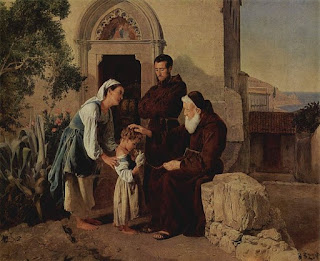Donegal
Dance
After what had
seemed a very long day
of talking,
and visiting, and listening
to the
secret woes of, oh, so many,
we had
arrived at the last,
to the old
farm on an ancient hill,
above a
half forgotten valley,
that seemed
to dwell in its own time,
to travel its
own long seasoned path.
A few thorn
trees broke the wind
before the whitewashed
walls.
A cow
watched us deliberately
conferring with
the few scraggly chickens
about these
strange visitors; a welcome distraction,
perhaps.
They
greeted us at the door then, the old couple.
Dressed in
Sunday best, they stood as much to attention
as their work
bent spines allowed.
Smiling
with heavy, creased, but still bright eyes.
We knew
then the far away neighbours had warned them
we were
near; two friars travelling from house to house.
the annual
days of the parish mission come again.
They beckoned
us in to two soft chairs
drawn up
beside the fire, there we settled into cushions
shaped by
long quiet night’s sitting for them, not us,
as they sat
on hard, straight, kitchen chairs
pulled from
dark corners.
Then we
talked, as you do, always
observing
the ancient Irish liturgy of visiting:
The
Weather?
“All right
for now, but sure it will change.”
Health?
“Good days
and bad days, neither of us as young as we were.”
The
Children?
“Well, they
are busy, they can’t make it here as often as they would like.”
The land?
“Enough for
us, but we will be the last to farm it,
there’s no
love for it in the young ones.
It’s a hard
life, but a good one.”
We listened
while scanning all the while this
place
caught out of time, yet redolent of deeper, quieter life.
“You’ll stay for the tea Fathers?”
The old
farmer said suddenly
It was, on
reflection,
more statement
than question.
For his wife
was already on her feet
and heading
for the kitchen.
To this day
I am glad we said yes
for the
miracle that came of it then
and was
ours alone to witness in the holiness of home.
Though at
the time the glance between us brothers
told of a
different mutual desire for return and rest.
“It was
ever such”, the Brother reminded me, later when we left,
speaking only
after we had passed a while of silent awe at what we had witnessed there,
“God’s
revelations are never expected,
Moses was
not looking for a burning bush that desert day.
The Shepherds
did not expect Angels overhead that night.”
“He is the
God of surprises after all.”
Perhaps the
Farmer did not want or need to continue chatting then,
the old man
rose and joined his wife in the small scrubbed kitchen,
while we
stretched our sandaled feet before the fire
and stared
across the hearth to where
the door
half open let us watch the dance begin,
as these
two souls, long made one,
in daily sacrament
of living, prepared the liturgy of tea.
Without a
word and each always aware of their partner’s presence
revolved around
each other as stars and planets do
in orbits long
settled since the foundation of being,
so they spun
and weaved, the one always in right relation to the other,
passing by
at just the right moment to receive from outstretched hand
the bread,
the butter, the jam, the cheese,
each always,
and without asking, just where the other needed them to be,
as their
silent waltz produced a table set and ready for us all
to gather,
seen and unseen, together.
We sat
breathless and blessed just watching,
knowing we
were witnesses of a secret communion
made all
the more sacred for its being born of ordinary duty.
Danced daily
for long years in that place,
Danced in a
Spring surrounded by chattering Children
Danced in a
Winter filled with worries and woes,
Danced in
love and long and lazy Summer nights
Danced now
in the Autumn of long burnished gold,
Danced under
the stars of Heaven
Danced with
the powers of Heaven
Danced with
the Divine Dancer
who is the
space and music both,
between all
souls who dance the daily dance of love.
Once, at
the end of a long day,
through a
half open door, in an old cottage,
on a
half-remembered hilltop in Donegal.
I sat in
silence and witnessed the cosmic dance
of love
incarnate take place
in an old
but well scrubbed kitchen
where brown
bread was broken
and we ate
beneath
the glowing
lamp
of the
Sacred Heart.
(Pic not mine, found on Pinterest)















